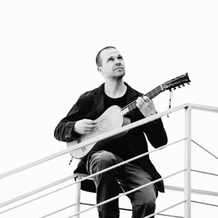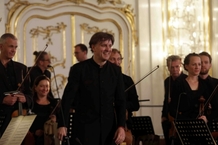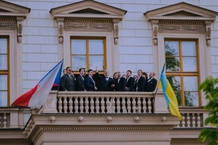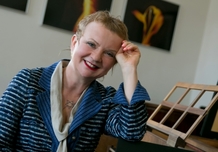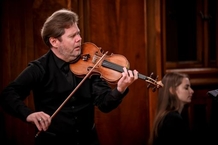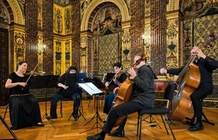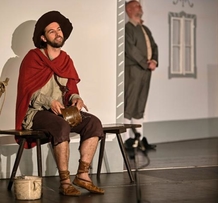Lukáš Pavlica
News
Feature articles
"Culture is a Bridge" was the theme of the second Czech-Austrian Partnership Concert, held on Friday, 20 December at Schloss Thalheim. It was the final evening of the 5th year of the pan-European project Czech Dreams 2024, and also part of the celebrations of the Year of Czech Music and the Concentus Moraviae international music festival. Culture is a bridge that connects not only different generations and social classes, but also entire nations. And the Czech Dreams project, which in 2024 alone presented music by Czech composers in 25 European cities in 17 different countries, is an eloquent example of this. In December alone, besides the final concert in Austria, six more concerts were performed in southern Europe, from Amarante in Portugal to Varaždin in Croatia. The concert was dedicated to the Lower Austrian Governor Erwin Pröll, who has long been committed to building and deepening relations between the Czech Republic and Austria. more
Ensemble Opera Diversa put a distinctive "spin" on its last orchestral concert of the year. It took place on 26 November at the Alterna music club, which is more a rock, electronica and indie pop hangout than an artistic music venue. The pair of selected pieces consisting of Vojtěch Dlask's premièred work Querell Songs for soprano saxophone and strings and Miloslav Ištvan's Hard Blues for pop-baritone, soprano, reciter and chamber ensemble also reflected this. Naturally, it was Ištvan's Hard Blues that gave the evening its name - the clash of the artistic, composed and purposefully "artistic" world (not meant pejoratively) with authentic African-American musical expressions springing from the depths of the soul of a man tested by life formed as the centre of the evening. This was not merely a stylistic inspiration, but more thematic, which was also evident in the opening piece of the evening. This was the composition Querelle Songs, inspired by Jean Genet's novel, previously dedicated to Ensemble Opera Diversa, but this time in a new instrumentation. more
Like other music festivals, the 29th annual Concentus Moraviae International Music Festival has not only had to reflect the fact that it is the Year of Czech Music, but also the unique 200th anniversary of the birth of Bedřich Smetana, the founder of modern Czech music. The dramaturgy of this year’s festival, which has just launched, is in the spirit of "Metamorphoses: Czech Smetana!". The first festival concert, which took place on 31 May at the Kyjov Municipal Cultural Centre, gave a hint of the direction the rest of the festival's dramaturgy will take. The organisers of the show decided to explore Smetana's work from a fresh angle and to work not only with the music, but also with the audience’s expectations. The opening evening saw a performance of Smetana's famous String Quartet No. 1 in E minor From My Life, but in an arrangement for a symphony orchestra penned by conductor and pianist George Szell. Smetana's work was complemented by the world première of the Concerto for Flute and Orchestra "Sadunkertoja" by Finnish composer, conductor and artist in residence at the 29th annual festival, Olli Mustonen, commissioned especially for the festival. Mustonen also conducted the Prague Philharmonia's performance of the two works. Danish flautist Janne Thomsen performed as soloist. more
Although this year’s 28th edition of the Concentus Moraviae international music festival embraces the theme Between Kroměříž and Vienna, the three-day project Island of Lutes by virtuoso lutenist and guitarist Pierre Pitzl holds a special place in its program design. From 16 to 18 June, the lute, vihuela or baroque guitar brought life to the castle grounds in Lysice and Rájec-Jestřebí with performances of works by Renaissance and early Baroque composers. The noteworthy culmination of the project was prepared by the organizers of the festival on Saturday, 17 June on the premises of the Rájce-Jestřebí Chateau. In addition to the vihuela and Baroque guitar player Pierre Pitzl, it also featured Renaissance lute player Ryosuke Sakamoto and theorbist David Bergmülller. more
For the twenty-eighth year running, the Concentus Moraviae International Music Festival presents dramaturgically varied and interpretively refined evenings set not only in concert halls, but also in courtyards and chateau salons, castle halls, basilicas, churches and synagogues. The theme of this year’s 28th edition is Between Kroměříž and Vienna. Vienna, the cultural centre of Europe, served as the seat of the Habsburg emperors, while Kroměříž was the home of the archbishops of Olomouc. The dramaturgy of this year’s edition was prepared by a trio of respected experts: the Dean of the JAMU Faculty of Music, harpsichordist, organist and musicologist Barbara Maria Willi; historian, musicologist and choirmaster Vladimír Maňas; and Otto Biba, Austrian musicologist and long-time director of the Vienna Gesellschaft der Musikfreunde archive. more
The Brno Philharmonic’s headquarters and one of Brno’s most important historical and cultural landmarks – the Besední dům – celebrates its 150th anniversary this year. Exactly on 3 April 1873, when the auditorium (great hall) of the building designed by architect Theophil von Hansen, author of the famous Musikverein in Vienna, was ceremonially opened, this magnificent building became the centre of Brno’s culture and its distinctive artistic life. A century and a half later – on Monday 1 May 2023 – an afternoon gathering and a subsequent concert entitled When Smetana First Played in Brno. . . will launch a series of concerts that pay tribute to unique milestones in the city’s cultural history. more
I talked to Barbara Maria Willi, the dean of the Faculty of Music at the Janáček Academy of Performing Arts, dramaturge, teacher, populariser of classical music, harpsichordist, organist and specialist on the hammered dulcimer, about the 20th anniversary edition of the music series Barbara Maria Willi presents..., as well as about historically informed interpretation and further plans. The fact that she was actively teaching a foreign student just before our talk is the best indication of how busy her schedule is. more
The latest addition to the concert series organized by the Brno-based Ensemble Opera Diversa is a chamber recital by violinist Milan Paľa and pianist Katarína Paľová entitled “Repentance”. The program, which took place on Sunday 30 October at Villa Stiassni, presented works by composers Valentin Bibik and the recently deceased Roman Berger, whose Adagio No. 2 "Repentance" (Pokánie) inspired the title of the evening. more
At the penultimate concert of its tenth year jubilee staged in the Fresco Room of the Comenium Elementary School, the Olomouc Baroque Festival presented an evening with the Musica Florea ensemble. The musicians, conducted by cellist Marek Štryncl, performed a selection of compositions by forgotten classical and early romantic composers Karl Kohaut, Jan Ladislav Dusík and Johann Nepomuk Hummel. The choice of composers was not random – this year it is 210 years since Dusík’s death and 185 years since Hummel’s death. Performing with the ensemble’s core members – violinist Magdalena Malá and Simona Tydlitátová, violist Lýdie Cillerová, cellist Marek Štryncl and bass player Ondřej Štajnochra – was Petra Matějová on the fortepiano. more
On 18 and 19 August, the tenth anniversary edition of the Olomouc Baroque Music Festival included a unique dramaturgical treat in its program – one of the most historically important Czech operas which, however, does not appear much on the stages of opera houses or music halls. This is Dráteník (The Tinker), the first original Czech opera composed by František Škroup to a libretto by Josef Krasoslav Chmelenský. It was directed by Kateřina Křivánková, with costumes and set by Sylva Marková and music by Marek Čermák, and performed by the Volantes Orchestra, the festival’s resident ensemble. Singing roles were taken up by Matúš Šimko (Dráteník/Škroup), Lenka Cafourková Ďuricová (Růžena), Vincenc Ignác Novotný (Vojtěch), Zuzana Badárová (Liduška), Aleš Janiga (Květenský), Jiří Miroslav Procházka (Lána), and Martin Vodrážka (Kůl). The purely dramatic roles of Chmelenský – the aforementioned author of the libretto – and Hranatý the guard were played by Martin Mihál. The reviewer visited the premiere performance. more








